Oil consumers may be deprived of price benefit
Govt expected to opt for exchange rate adjustment, increase in taxes

Despite declining petrol prices, the government may not pass on the full benefit to the domestic consumers due to staggered exchange rate adjustment of Pakistan State Oil (PSO) and a possible increase in taxes. This fortnight, PSO had worked out an exchange rate adjustment of Rs31 per litre for petrol and Rs16 per litre for high-speed diesel, which was meant to be passed on to consumers.
Oil and Gas Regulatory Authority (Ogra), however, turned down the calculations, directing the oil company to revise its workings such that they help cut prices and pass on minimum impact to consumers. The regulator allowed an exchange rate adjustment of Rs8.02 per litre for petrol and Rs3.63 per litre for highspeed diesel. Sources say that according to the Platts and exchange rate, diesel price will go up by Re1 per litre while petrol price could decrease up to Rs12.98 per litre.
The proposed revisions are subject to no increase in petroleum levy (PL), sales tax imposition or exchange loss adjustment. Officials in the oil sector predicted that PL on petrol would increase by Rs10 per litre and that there would also be some adjustment for the previous month exchange loss as well. Another factor that can impact the price is the imposition of sales tax, they added. At present, there is zero general sales tax on petrol and diesel.
Therefore, the government may increase sales tax on petrol and diesel to make revenue on sale of these products. Officials were of the opinion that the regulator and government needed to allow PSO an adjustment of exchange rate on petrol and diesel to absorb the impact of reducing petrol prices. PSO is now looking for exchange rate adjustment of Rs8.02 per litre for petrol and Rs3.63 per litre on highspeed diesel. If the government allows these adjustments, the price of petrol may decrease by around Rs3 per litre.
The price of high-speed diesel, however, may go up further by around Rs9 per litre. In this calculation, the margin of Oil Marketing Companies (OMCs) and dealers on sale of petroleum products would be Rs3.68 per litre and Rs7 per litre respectively. This fortnight the average exchange rate taken has been Rs216.43, down by Rs11.42 compared to the last fortnight. Sources allege that the government and regulator have been applying different manoeuvres to keep oil prices low to avoid political backlash. As PSO imports petroleum products, the state-run oil marketing company is allowed exchange rate adjustments to save itself from losses. In an attempt to minimise the impact of oil prices on the masses, the government devised a new formula for calculating the exchange rate for oil price revision.
Earlier, it was taking the exchange rate of the last day, however, under the revised formula it is now taking the average exchange rate. On August 1, 2022, the last day on which the oil price revision was meant to be calculated, the exchange rate had come to Rs250. Instead, the government took an average exchange rate of Rs225, reducing oil prices. As a result, on August 15, the average exchange rate stood at Rs228, higher than the market rate. This resulted in an exchange rate adjustment of Rs31 per litre in petrol and Rs16 per litre in high-speed diesel.
Ogra, however, built pressure on PSO to stagger the exchange adjustment loss. According to the existing mechanism, the government only takes PSO prices to set new prices for petroleum products in the country. PSO, whose receivables had crossed Rs600 billion for the first time in history, is struggling once again under the directives to stagger the exchange loss. Currently, PSO receivables stand at Rs538 billion



















COMMENTS
Comments are moderated and generally will be posted if they are on-topic and not abusive.
For more information, please see our Comments FAQ